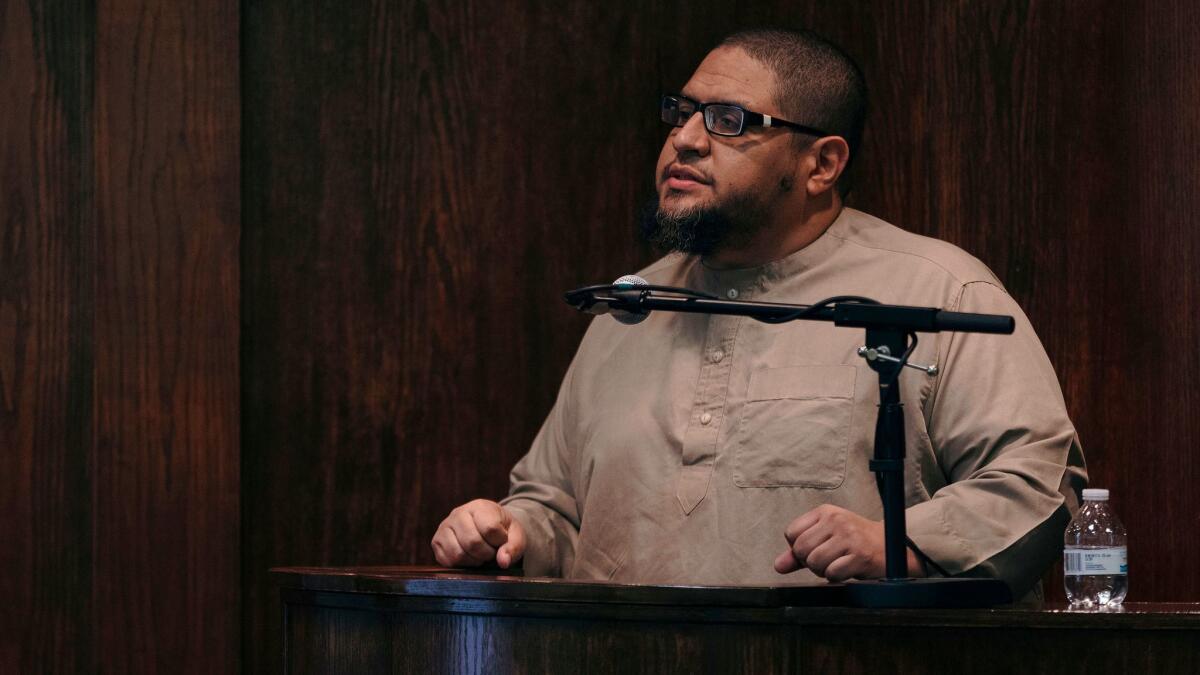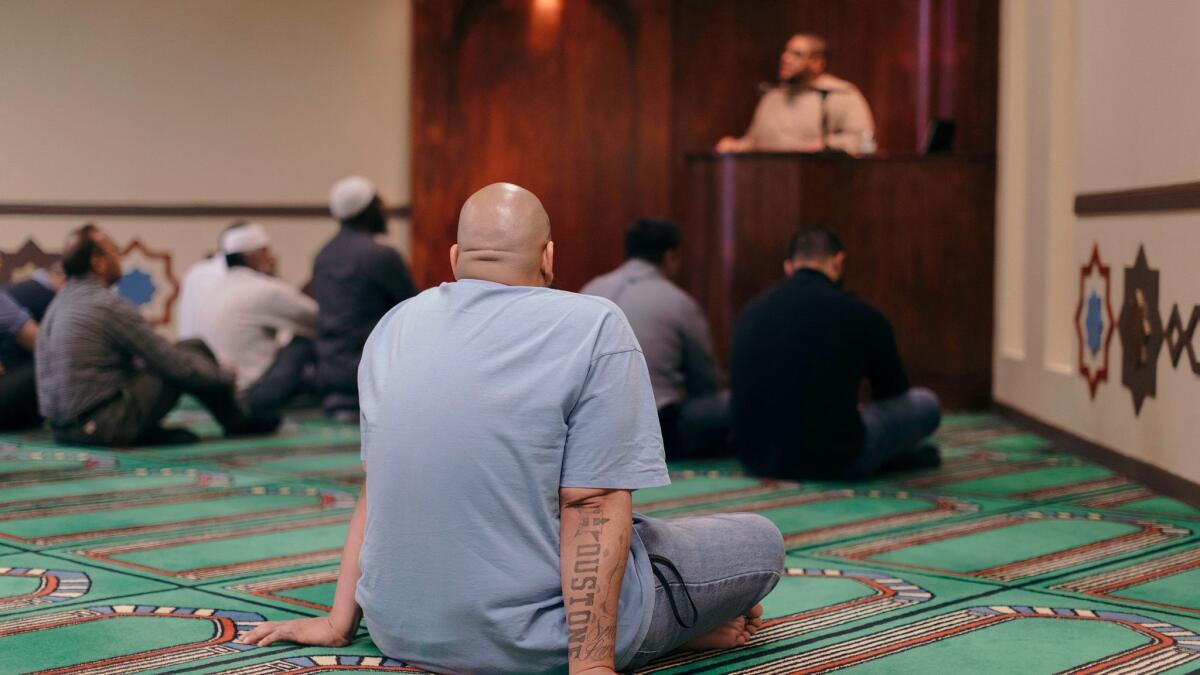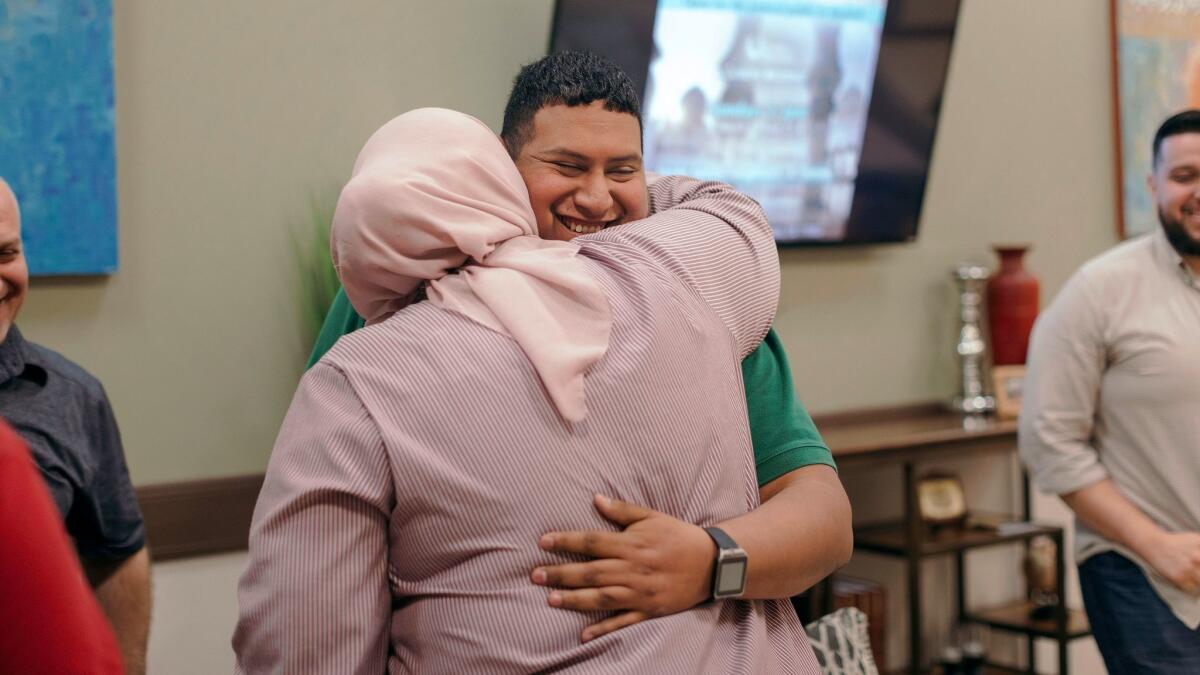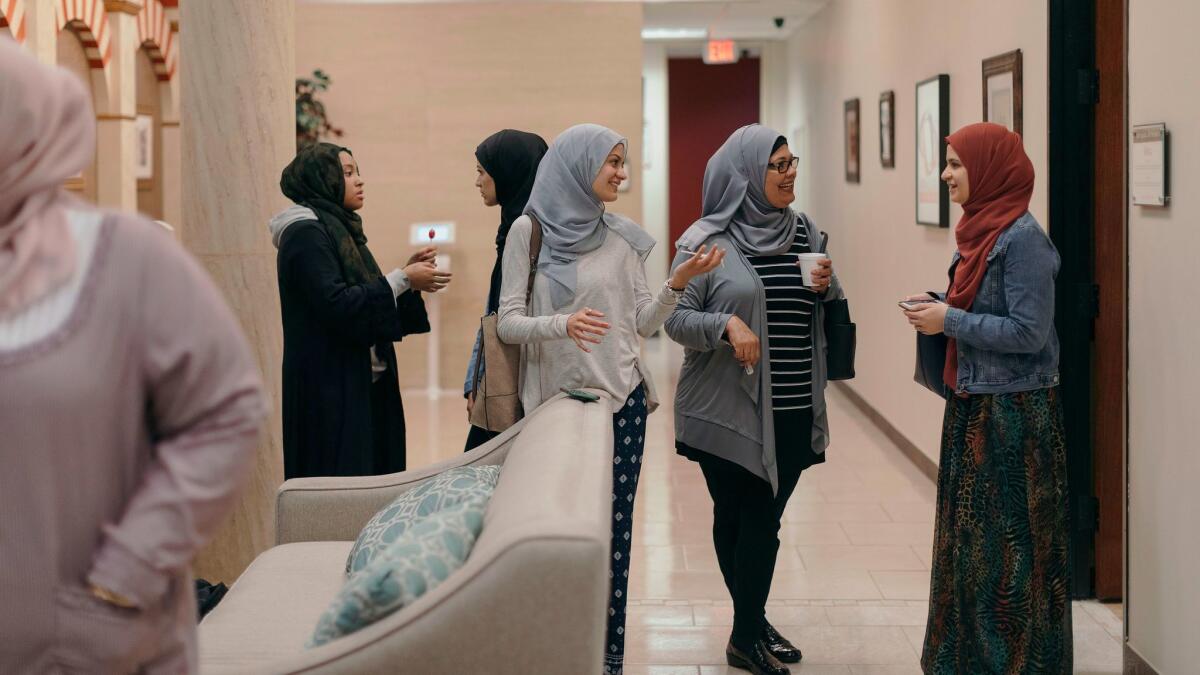At the nation’s only Latino mosque, Trump’s immigration policies have ‘changed everything’

Centro Islámico, the nation’s first Spanish-speaking mosque, was founded just over a year ago in Houston.
- Share via
Reporting from Houston — Sitting recently in his office in a converted bank across from a suburban strip mall, Isa Parada methodically thumbed through scripture as he recalled the contrasting moments of his first month leading one of the city’s newest and most unusual houses of worship.
There was the undocumented Mexican congregant who was arrested by immigration officers, leaving his wife and child behind. There was the Syrian American worshiper who wondered after the president’s travel ban if she’d ever see her relatives again. There was the young Mexican American near tears after he converted to join the congregation, part of a stream of newcomers. There were the emails and calls thanking Parada for being there at a time when the country’s leader broadly painted immigrants and Muslims as being prone to violence.

“Man, he’s changed everything,” Parada, a stocky, bearded Salvadoran American, said of President Trump. “In some ways, he’s turned our world upside-down.”
Last month, Parada became the first full-time imam at Centro Islámico, the nation’s only Spanish-speaking mosque. The congregation, which counts among it dozens of Mexican Americans and other converts, serves one of the fastest growing segments of Islam in the U.S.: Latinos.
Now, with the president’s sweeping immigration changes through his travel ban and deportation push, those at Centro Islámico have been affected in ways few imagined when it launched just over a year ago on the far western edge of Houston.
They’ve also come to play a unique role as a bridge between the nation’s Muslims and Latinos, two groups in the crosshairs of some of the most controversial administration moves. Representatives of both have taken to the streets and courts to battle the White House.
“What I try to tell people is that Donald Trump becoming president for us is giving us more confidence as Latino Muslims. It’s an opportunity for us to talk about Islam, to talk about our immigrant stories,” said Parada, 39. “But we also have to be realistic. You hope it never gets back to what happened to the Japanese.”
According to the Pew Research Center, there are more than 100,000 Latino Muslims in the U.S. They make up a sliver of the nation’s 3.3 million Muslims and a smaller portion of its 57 million Latinos. They’re concentrated in areas with large Latino populations such as California, Texas, Florida and New Jersey. But the heart of the community is Houston, where occasional Spanish-language services have taken place at traditional mosques for years under the guidance of Islam in Spanish, an educational nonprofit that largely focused on producing online videos and distributing Spanish-language Korans — until it launched Centro Islámico.

Here, the Muslims are immigrants and those born in the U.S. to parents who crossed the border, as well as people whose families trace their lineage south of the Rio Grande but have lived in the U.S. for generations.
The mosque spans 5,000 square feet, including a prayer hall, social room, gift shop, a small exhibit on Islamic history and a studio where sermons and classes are streamed online. A white concrete building with dark, tinted windows, it comes to life inside where walls are decorated with red and white striped patterns reminiscent of the Mezquita de Córdoba, the famed 10th century Spanish mosque.
Arab Muslims ruled Spain for centuries beginning in the Middle Ages, leaving an Islamic influence on culture and language that remains today. It’s a legacy the center’s Muslims point to as part of their shared history.
The Latino Muslim community in Houston now tops 1,000 Muslims. Dozens show up for Friday congregational prayers, and hundreds come for holiday services at Centro Islámico. Trump’s name has been said perhaps only less than Allah’s and the prophet Muhammad’s at the mosque since its grand opening — and has become a constant if silent backdrop to part-English, part-Spanish sermons.
But only recently has the president had a measurable impact as his campaign promises turned into policy.
After Trump signed his first executive order pausing refugee resettlement and travel from seven majority-Muslim countries, concerns grew among women married to Middle Eastern and African Muslim men.

Some in the community rallied at Houston’s airport as travelers were detained in a shaky first rollout of the travel ban. Others headed to Austin last month for “Texas Muslim Capitol Day” to plead with lawmakers to aid Muslims such as those whose mosque in Victoria, two hours from Houston, burned to the ground in January.
When the Department of Homeland Security announced it would make it easier for immigration agents to arrest and deport those living in the country illegally, stories spread at Centro Islámico of traffic checkpoints and raids at grocery stores. One man is in proceedings to be deported to Mexico. Younger members who are “Dreamers” — people who enrolled in a program under President Obama that halted deportations of certain immigrants brought to the country as children — are praying their status continues.
It’s hard to be as “strange and different” as Latino Muslims, Parada — who converted 21 years ago from Catholicism after reading about Malcolm X — told a few dozen congregants during a recent sermon. It’s hard, he said, to be asked by relatives why he doesn’t drink anymore, or be looked at by uncles as if “something is not normal with you.”
“But Allah knows this — he is watching and knows everything — Islam began as something strange,” he said, telling the crowd to be patient with their friends and relatives, and with the nation. The Latinos in the room could be an example to the city and their workplaces, Parada said, of how in Islam “women are equal to men,” of how Islam is a faith of peace and justice.
Afterward, members lingered in a hallway to commiserate over the their place in America. They encouraged each other to be steadfast in faith and spirit.
They were newer Muslims, ones who long ago converted from Christianity, and those born into the religion. They talked of the pride and sorrow, the joy and pain — and the humor — in sitting at the nexus of maligned faith and ethnicity.

“I went to get a car wash today and I saw a lady — I could tell she was Latina — and she had henna on her hands,” said Monica Morales, a Mexican American who also goes by Noor. “So I’m like, in Spanish, ‘Oh my, is that tattoo henna?’ And she was like, ‘I didn’t know you speak Spanish.’ I say, ‘Yes, I’m Mexican.’”
“She said, ‘Oh, wow, I thought you were from over there.’” Morales gestured to her yellow hijab, mimicking the woman. She had only begun covering her head the day after Trump’s election, partly in an act of defiance.
Susan Barrientos, a 28-year-old Bolivian American who grew up in Houston, chuckled and chimed in.
“But Trump’s also brought out the opposite in people. I’ve seen non-Muslim people go out of their way to be nicer,” said Barrientos, who converted when she was 18 and is married to a Puerto Rican Muslim. As a hijab-clad woman with six kids, she’s gotten used to sneers and snide remarks while out shopping, she said. But she was surprised recently at Costco when two elderly white women came up to her to tell her she had a beautiful headscarf.
“These days, if they don’t like you … they won’t say anything. They’ll just kind of look at you, maybe they give you the stink-eye. For us, I think it’s helpful because it really changes your behavior in public because you want to represent Islam in the most positive way,” she said.
Juan Pablo Osorio, a 30-year-old who immigrated from Colombia when he was 11 and runs the center’s YouTube channel, replied to Barrientos.
“We’re used to the struggle, man. All of us have had some type of family that’s illegal, had to struggle and figure some way to get papers. So that’s like, nothing new to us, being marginalized, being looked at as different,” said Osorio, who converted after meeting Iraqi Muslims as a Marine. “I remember when I didn’t know English, the way people used to treat me. … So now that it is happening to the Muslim community, we can help them, right? Because we’ve been through it.”
Barrientos cautioned her brothers and sisters in faith not to overplay the dangers faced by Muslims.
“I think of Sept. 11. Being Muslim during Bush and the Patriot Act, that was far scarier. … I feel nothing but love now. I see people who would not normally not be on my side be like, ‘You know what? We are all one,’” she said. “Everything that’s bad, there’s always something good that’s coming out of it, you know?”
One by one, the crowd replied in Arabic.
“Mashallah,” they said. God willed it.
“Alhamdulillah,” they said. Praise God.
Jaweed Kaleem is The Times’ national race and justice correspondent. Follow him on Twitter, Facebook and Instagram.
ALSO
The troubled, covert agency responsible for moving the nation’s most lethal cargo
Number of immigrants caught at Mexican border plunges 40% under Trump
Sikhs opened their temple doors to Oroville Dam evacuees — and strangers came pouring in
More to Read
Sign up for Essential California
The most important California stories and recommendations in your inbox every morning.
You may occasionally receive promotional content from the Los Angeles Times.











